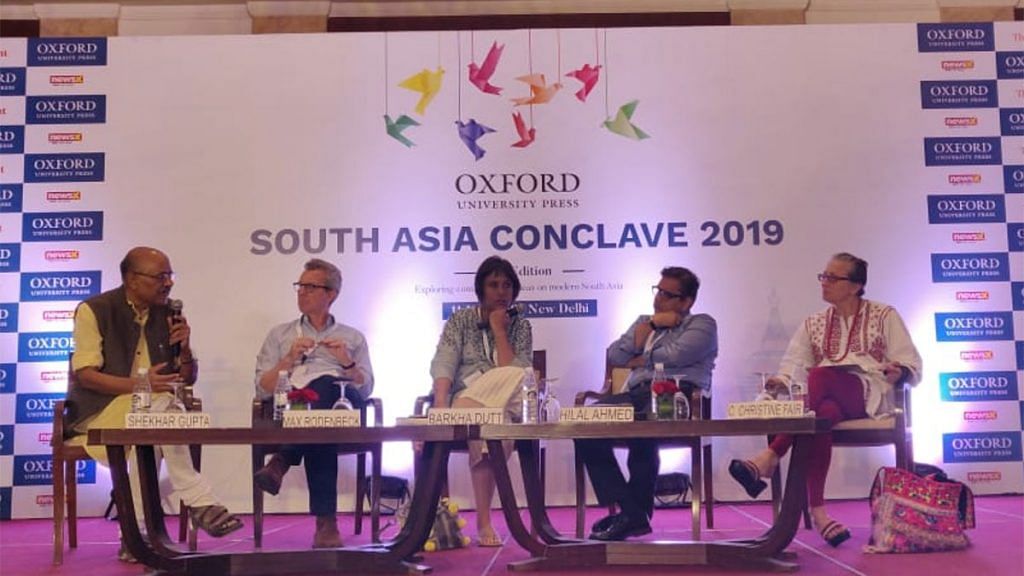New Delhi: More than any other terror group, the Lashkar-e-Taiba (LeT) is the most loyal to the Pakistani military establishment, American political scientist Christine Fair said Thursday.
She underlined that the outfit was valuable to Pakistan’s ISI and the military for two chief reasons. “Lashkar isn’t useful just because it is a lethal and disciplined organisation. With Jaish-e-Mohammed (JeM), you never really know if a member is a good or a bad terrorist. This isn’t a problem with Lashkar,” Fair said during a panel discussion at the South Asia Conclave 2019.
“Secondly, in Pakistan, it (LeT) plays a major domestic role,” she said. “It is a vigorous opponent to all Deobandi groups. Ironically Pakistanis have patronised the Deobandis for a long time. But it is the backlash of Deobandis that is killing Pakistan.”
“Not enough people know it but the ISI is at a lethal war with Deobandi groups. And LeT is its ally in that war,” Fair said. Some of the other Deobandi groups include the JeM, the Tehrik-i-Taliban Pakistan and the Lashkar-e-Jhangvi.
The panel was on Fair’s recent book, In Their Own Words: Understanding Lashkar-e-Tayyaba, and featured Shekhar Gupta, Editor-in-Chief of ThePrint, Max Rodenbeck, the South Asia Bureau chief of The Economist and Hilal Ahmed, associate professor at the Centre for the Study of Developing Societies (CSDS). It was moderated by journalist Barkha Dutta.
ThePrint is the digital partner of the conclave.
Also read: Lashkar members more educated than average Pakistani male, says scholar Christine Fair
Understanding Lashkar
In Fair’s view, LeT is distinct from all other Deobandi groups.
To begin with, she said it does not believe in conducting jihad against Pakistanis. Thus, it denounces the idea of takfiri — whereby one Muslim declares the other to be an infidel.
Fair told the audience that LeT has often told ISIS that “our standard of Islamic jurisprudence is so much higher than yours” and that “we don’t need to listen to you”.
In another fascinating insight, Fair remarked that only one out of 10 of LeT’s members get involved in combat operations. The rest are used for domestic propaganda purposes.
The use of Pakistani non-state actors
The panel discussed the role of the Pakistani “deep state” in proliferation and use of terrorist organisations against India and Afghanistan.
“I have been saying this since 2001, the LeT is a regiment of the Pakistani army, run at a very cheap cost,” Shekhar Gupta said. “And Indian army can never create something like that.”
Gupta also remarked that the “Pakistanis have very good tactical thinking and very poor strategic thinking”. He recounted a line that scholar Stephen P. Cohen had once told him, “The Pakistani Army is the greatest army in the world that has never won a war.”
On Pakistan distancing itself from such terror outfits, Max Rodenbeck recounted an interview he had conducted with Pakistan’s Chief of Army Staff General Qamar Bajwa.
“General Bajwa said to my face, we will not let these goons (militants) dictate our foreign policy,” Rodenbeck said. Responding to this, Fair said that it was not possible to believe Bajwa unless the Punjab (Pakistan) Police acted against these groups and the state stopped providing them protection and security.
Pak has mastered the art of ‘plausible deniability’
Fair added that Pakistan had mastered the art of “plausible deniability”.
Talking about the institutional hierarchy within the Pakistani establishment that manages these terrorist groups, Gupta asked a pertinent question. “Are there deep states within deep states within deep states within deep states or there is a person sitting on top, playing this elaborate game?”
When asked about how the recent Pulwama-Balakot episode had changed the deterrence dynamic between India and Pakistan, Gupta said, “History of Indo-Pak relations were refreshed on 26 February. Every major attack on India will now be followed by a swift response.”
“If anyone thinks otherwise, it is just lazy intellectualism,” added Gupta.
Also read: Pakistan military can’t handle growing Pashtun storm, so it’s blaming countries like India
